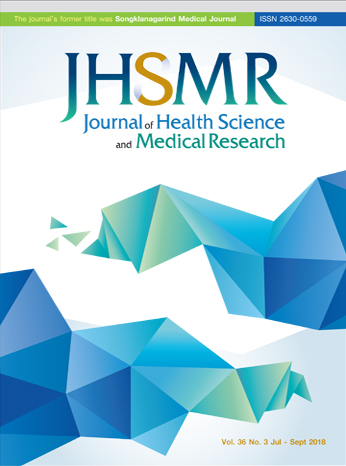Comparisons of Methods and Outcomes of Warfarin Guideline-based Management in Patients on Warfarin Therapy whose International Normalized Ratio (INR) is Higher than Target INR at Vachiraphuket Hospital
DOI:
https://doi.org/10.31584/jhsmr.2018.36.3.12Keywords:
guideline-based management, INR, taget INR, warfarin, warfarin guidelinesAbstract
Objective: To compare the methods and management outcomes based on the warfarin guidelines of Vachiraphuket Hospital in patients receiving warfarin whose international normalized ratio (INR) is higher than target INR at Vachiraphuket Hospital.
Material and Methods: Retrospective analytic studies were conducted. The data were collected from retrospective outpatient medical records from 1st January 2012-9th September 2016.
Results: Sixty-seven patients with a total number of 178 events of INR higher than the target were reported. All events were divided into 84 events and 94 events which dealt and did not deal with the management method according to the warfarin guidelines of Vachiraphuket Hospital, respectively. After treating patients based on the hospital management guidelines, 33 events (39.3%) achieved target INR and 51 events (60.7%) were out of the target INR range. In the cases of patients who were not treated based on the hospital guidelines, 39 events (41.5%) were in the target INR and 55 events (58.5%) were out of INR range. Comparing the management methods and their outcomes, there was no statistically significant difference in achieving target INR between the patients treated with the hospital guideline-based method or the non-guideline-based method (odds ratio=0.913, p-value=0.765).
Conclusion: According to the warfarin guidelines of Vachiraphuket Hospital, the management for patients with INR higher than target INR was probably unsuccessful for everyone. Therefore, the management of each individual patient should be carefully considered
References
2. Tantiviyavanit J, Chaiyasu R. Effects of pharmaceutical care on patient taking warfarin at Pattani Hospital. Thai J Pharm Pract 2013;2:108–19.
3. Leasinoudom S, Chumworathayi P, Chaiyakum A. Drug use review of warfarin in medicine ward, Srinagarind Hospital. Srinagarind Med J 2010;25:6-13.
4. Jittsue A, Yeephu S, Potaros T, Sekkhunthod J, Timkorn P. Study of knowledge and drug related problems of warfarin at outpatient Vachira-phuket Hospital. Songkla Med J 2015;33:83-92.
5. Geer MI, Koul PA, Tanki SA, Shah MY. Frequency, types, severity, preventability and costs of adverse drug reactions at a tertiary care hospital. J Pharmacol Toxicol Methods 2016;81:323-34.
6. Schulman S, Kearon C. Definition of major bleeding in clinical investigations of antihemostatic medicinal products in nonsurgical patients. J Thromb Haemost 2005;3:692-4.
7. Gitter MJ, Jaeger TM, Petterson TM, Gersh BJ, Silyerstein MD. Bleeding and thromboembolism during anticoagulant therapy: a population-based study in Rochester, Minnesota. Mayo Clin Proc 1995;70:725-33.
8. Nathisuwan S, Dilokthornsakul P, Chaiyakunapruk N, Morarai T, Yodting T, Piriyachananusorn N. Assessing evidence of interaction between smoking and warfarin: a systematic review and meta-analysis. Chest 2011;139:1130-9.
9. Palareti G, Leali N, Cocchere S, Poggo M, Manotti C, Angelo A, et al. Bleeding complications of oral anticoagulant treatment:an inception-cohort, prospective collaborative study (ISCOAT). Lancet 1996;348:423-8.
10. Tonna A, Tonna I. The complexity of treatment with warfarin. J Malta Coll Pharm Pract 2006;11:31-5.
11. Jaffer A, Bragg L. Practical tips for warfarin dosing and monitoring. Cleve Clin J Med 2003;70:361-71.
12. Tai C, Wu H, San C, Chua D. Management of supratherapeutic international normalized ratio without bleeding after warfarin use: an evaluation of vitamin K administration (SUPRA-WAR-K Study). Can J Hosp Pharm 2017;70:207-14.
13. Wattanachai N, Kaewmoongkun S. Warfarin: pharmacology and factors affecting its response. Srinagarind Med J 2017;32:189-99.
























